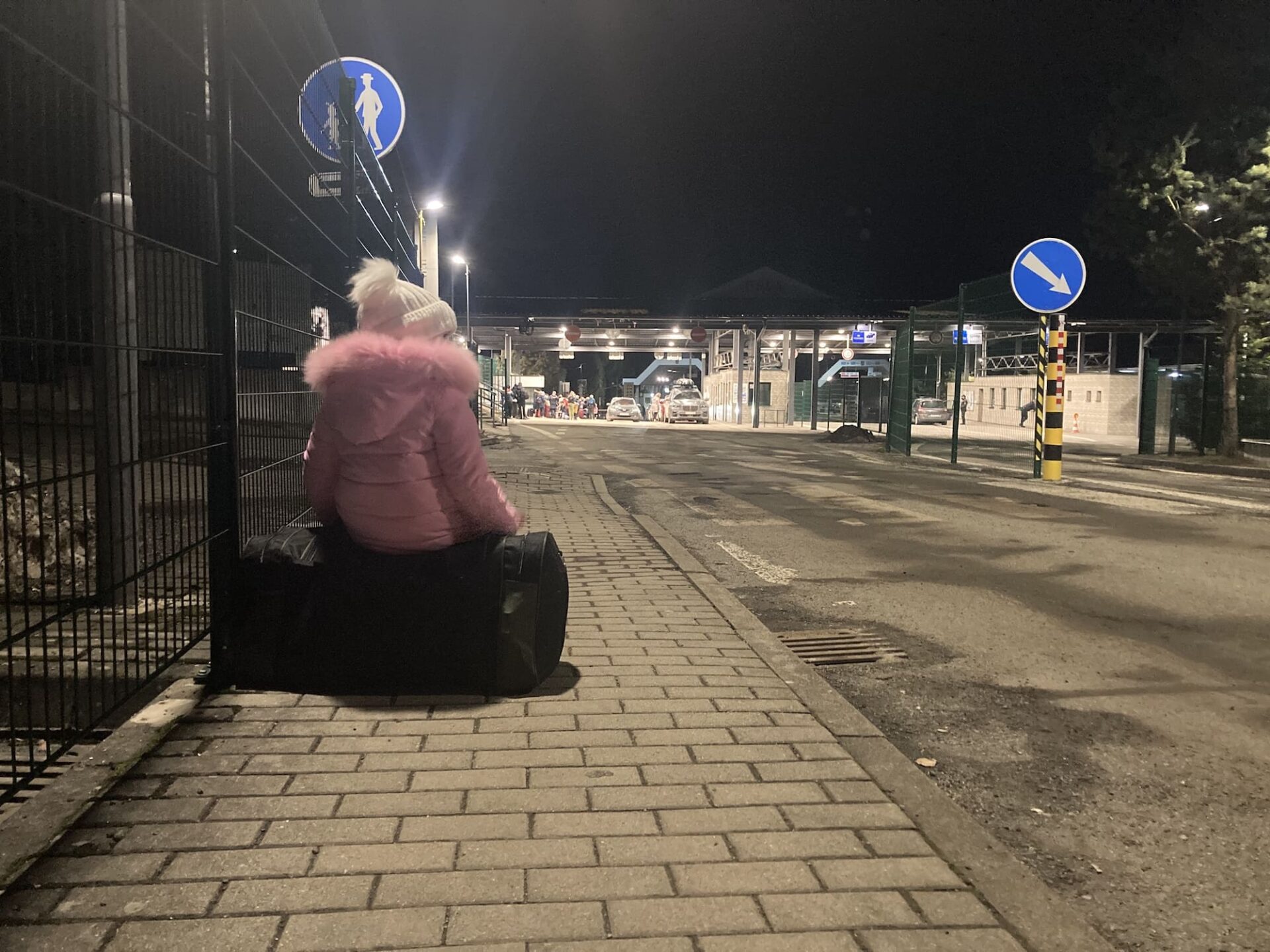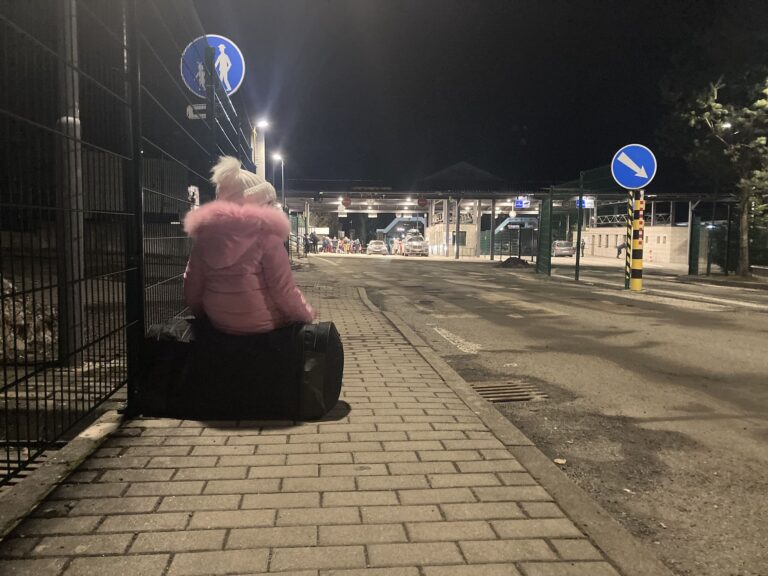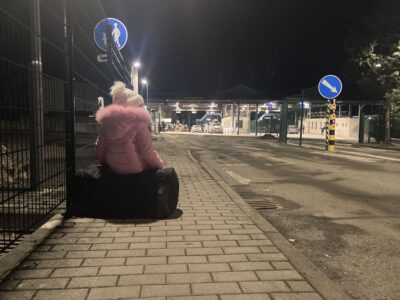The moment I arrived at the border a few days ago, I was positively shocked by the huge display of solidarity of the Slovak people.
“Ask me where I am from,” an older gentleman tells me when we get inside the firefighters’ bus, which will take us from the border to the nearest big parking lot.
“Where are you from?” I oblige.
“From Kyiv,” he says. He wants to tell me more, but he can’t right now. His name is Grigori, he is 65, and he just got across the Ukrainian-Slovak border, arriving in Veľké Slemence.
This small border crossing is only for people on foot. It is Monday, February 28, and this is the best option for refugees who are fleeing without cars. Grigori and his family waited only about two hours on the Ukrainian side of the border.
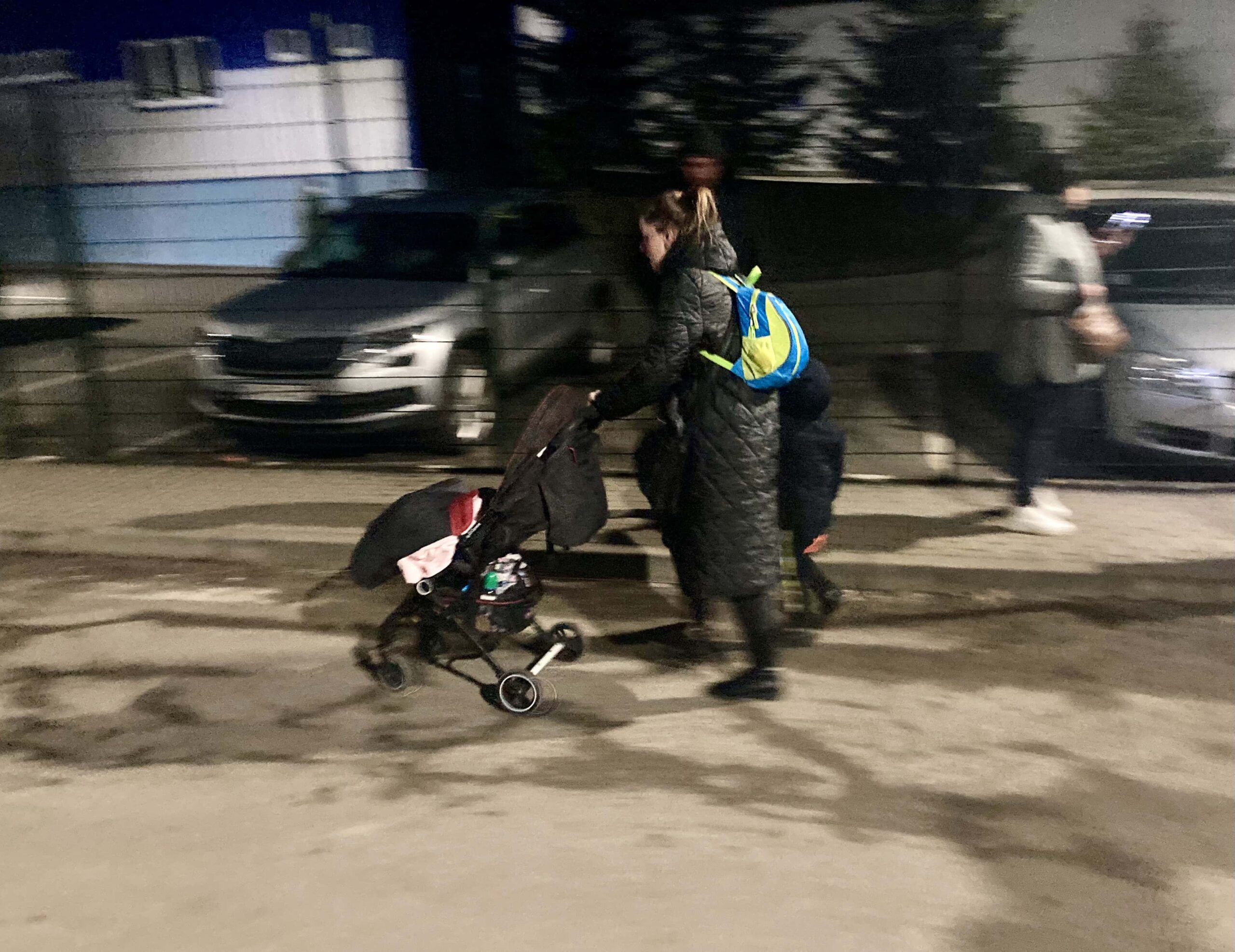
Border crossing in Ubľa. Source: Tomáš Madleňák
The situation at the other two bigger border crossings into Slovakia is much worse. In Ubľa, as well as at the Uzhgorod-Vyšné Nemecké crossing, waiting times have increased from around 8 hours on Friday, when I first arrived to monitor the situation, to far above 20 hours now.
Grigori fled from Kyiv with his wife, daughter, and granddaughter. His son as well as the father of his granddaughter had to stay in Ukraine. I keep them company until they reach Košice – the first big Slovak city from the border, the nearest stop for most of the refugees. From Košice, they can board Slovak trains to Bratislava, which are completely free of charge for anyone with Ukrainian documents.
Once we are in the car to Košice, he tells me more. They were adamant that they would not run and stay in Kyiv. They spent two days in the basement of their home – until a missile hit the apartment building just next to theirs. “We don’t want to evacuate; we want peace,” his daughter tells me. But given the situation they felt like evacuation was the only option.
They don’t understand this war. The ironic thing? Grigori tells me, “I am actually Russian, my wife is also Russian.” They lived in Ukraine; their children were born and raised there. Grigori says that until the Russian invasion, he was opposed to Ukraine joining the EU. But his opinion on the matter has changed completely now.
He used to watch both Ukrainian and Russian television. But he tells me that everything Vladimir Putin has proclaimed about why Russia is invading Ukraine – talk about denazification, claims that he is freeing Russian people from Nazis – he considers “complete lies.”
We do not talk much more for the rest of the ride. They connect to my Wi-Fi hotspot and find recent videos in which buildings they know well and streets they walked on just days ago are being bombed.
A wave of solidarity
The moment I arrived at the border a few days ago, I was positively shocked by the huge display of solidarity of the Slovak people. In Vyšné Nemecké, the local Greek Catholic priest, František Engel, set up a tent with water, hot tea, food, and baby supplies.
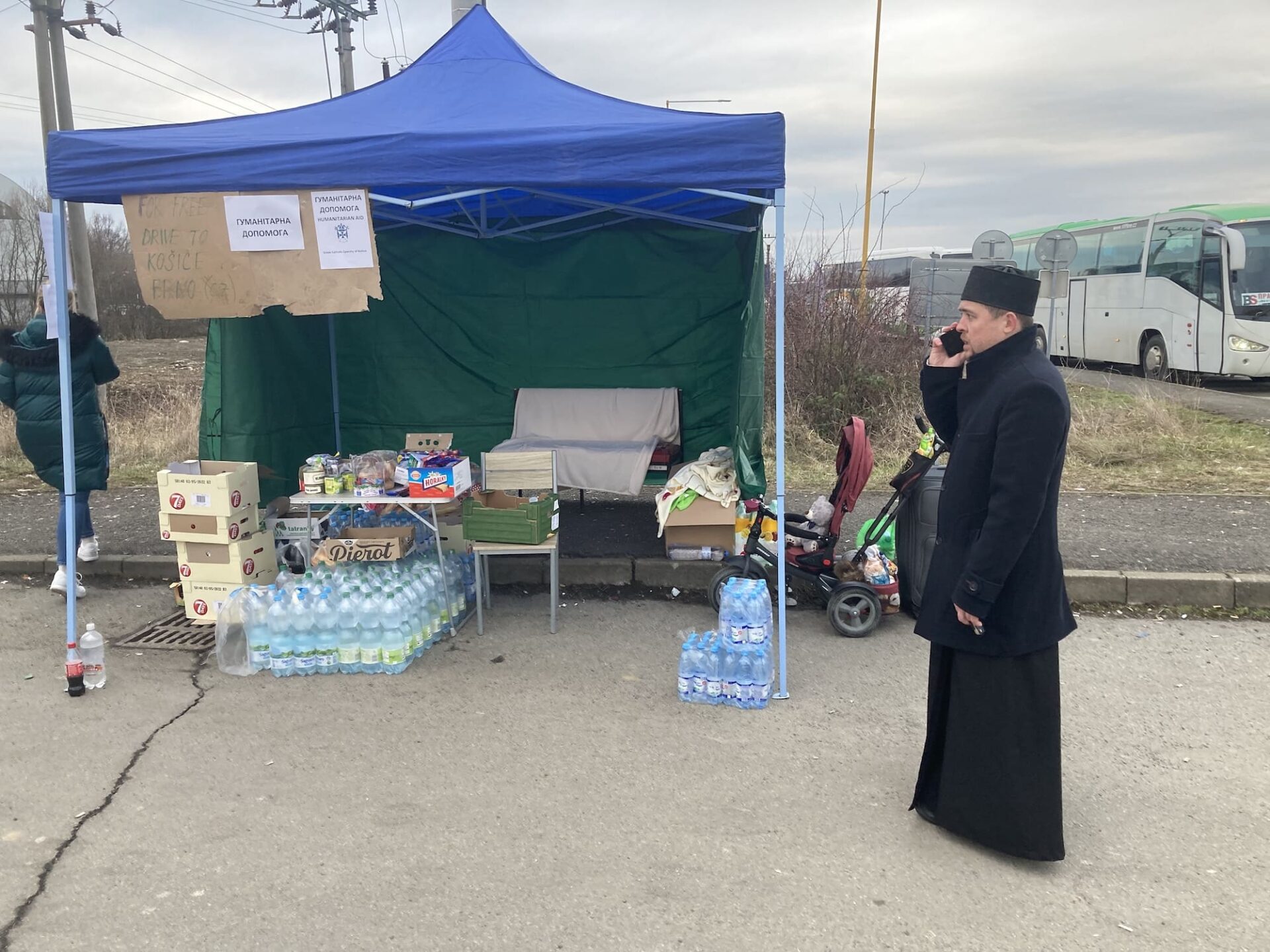
František Engel, Uzhgorod-Vyšné Nemecké crossing. Source: Tomáš Madleňák
“We came to look at the situation in the morning, and we started with just one table. Just some blankets, some biscuits for the children,” he tells me. One day later, he had more supplies than he could fit in two tents, so he began sending surplus supplies across the border.
More charities have also shown up at all the border crossings – Maltesers, Caritas Slovakia, the Red Cross, and others.
Here, as well as in Ubľa, there are dozens of Slovak citizens who do not belong to any charity. They have come to offer free transport to the refugees, driving them in their own cars to Košice, Prešov, or even as far away as Bratislava and beyond – to the Czech Republic, Poland, Germany.
František Engel, together with the mayor of Vyšné Nemecké, also organizes emergency shelters – places where refugees can wait out the night – at his house as well as in the village community center.
Hundreds of Slovaks are also offering their own houses and apartments to these refugees; there are websites where fleeing Ukrainians can sign up for this kind of help. The government also provides emergency shelter in the nearest Slovak towns.
Most refugees are however awaited at the border by their relatives or friends who live in the West. There are cars here from Slovakia and the Czech Republic; some even have British plates. Most of those who are not picked up by anyone want to board the train in Košice and continue west as soon as they can.
Provocateurs
On Friday, Slovak government officials showed up at the border crossing in Vyšné Nemecké, where they had a small press conference. They talked about the need to help refugees and also condemned the Russian attack on their neighbor.
As they spoke, women and children fleeing from Ukraine were walking by them. But there was also a middle-aged Slovak man dressed in red, who started screaming at the prime minister and his ministers.
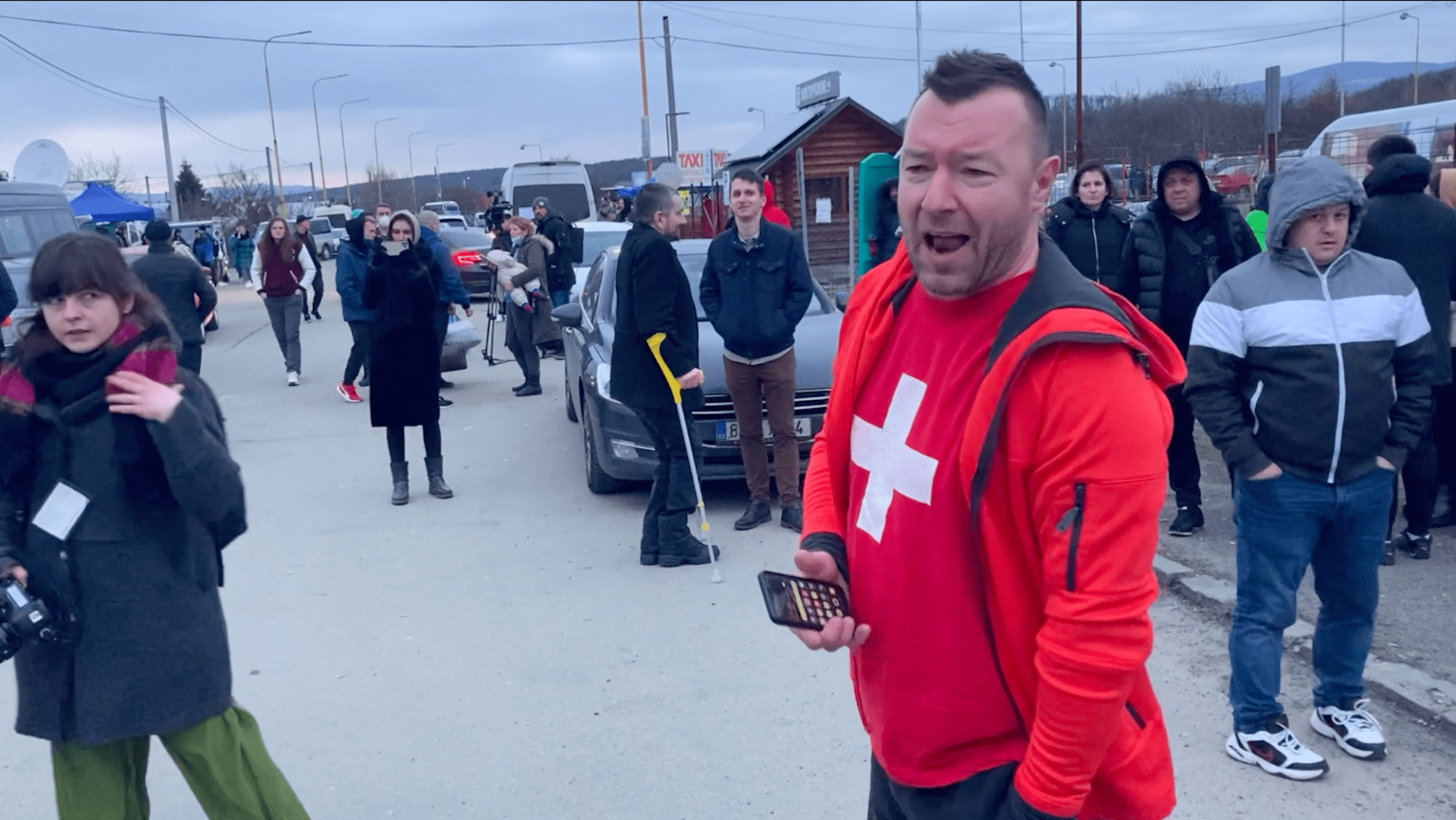
Screaming man at the border crossing in Vyšné Nemeck. Source: Tomáš Madleňák
“Yuck! Shame on you, pigs! Parading here in front of the people, inviting American armies here. Shame on you, yuck!” he screamed, before quickly walking away. “I hope that one day Putin will pay you back for this all!” he screamed again before disappearing.
When the Russian attack came, the Slovak disinformation scene was taken by shock at first. Up until that point, Kremlin supporters claimed the West was only fearmongering and there would never be any invasion.
But it only took them a few days to find a new angle. They have started focusing on the refugees, who have received an outpouring of solidarity from the Slovak people. But since Sunday, large groups of non-Ukrainian nationals have been crossing the border into Vyšné Nemecké.
This is completely normal and to be expected because there are many foreigners in Ukraine and, since all flights have been canceled, they must also flee by land. According to the Slovak police, from the start of the war until noon on Monday, 41,555 Ukrainian nationals had crossed the border. The second largest group escaping the conflict comprised citizens of Morocco, 1,362 of whom have entered Slovakia.
At some point, from the right angle, it might seem as if there are more black and Arabic-looking people in Vyšné Nemecké than Ukrainians. There could be several reasons for this. There have been reports that the Ukrainian border police lets foreigners skip the lines sometimes; some claim border guards are willing to take bribes.
The situation has been exploited by the Slovak far-right party Kotleba – ĽSNS, which has released a video of one of their MPs at the Vyšné Nemecké at night, claiming he came to help Ukrainian women and children, but “he has seen Africa”.
The Slovak police warn that this narrative is starting to be spread by numerous Facebook accounts. In general, it seems like the Slovak authorities have woken up after the Russian invasion and become much more assertive in the fight against disinformation.
Friday, the Slovak parliament even passed an amendment to the Cybersecurity Act, giving the National Security Authority the power to switch off websites that produce pro-war propaganda.
Even the biggest disinformation website in Slovakia, Hlavné správy (Main News), has reacted. Although criticizing the amendment, they announced that they will only release basic news about the war, and so far they have just published information from the official Slovak press agency.
The lies being told about “Africa” in Vyšné Nemecké, however, show that pro-Kremlin actors are not going to give up so easily.
Tomáš Madleňák is a Slovak journalist who has worked for the Investigative Center of Ján Kuciak since 2020. He is based in Bratislava.

